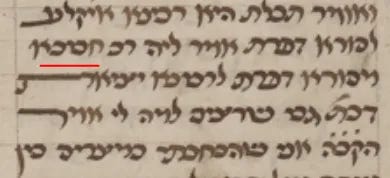Rav Chanina of Sura makes an appearance on Sotah 25a, one of a handful of appearances in Talmud. A dilemma was raised before the Sages: if a woman violated the Dat (precepts of halacha regarding modesty), does she require warning to lose her ketubah? The two sides are that she loses it for merely violating, or that a warning might cause her to repent. Several fourth-generation Amoraim (Abaye, Rava, Rav Yehuda of Diskarta) and one fifth-generation Amora (Rav Pappa) discuss proof from sequential quotations of the preceding Mishnah (which begins on 23a), and how the possible implication of warning isn’t there for losing the ketubah collection but for a different impact.
Finally, a sixth-generation Amora, Rav Chanina miSura, offers convincing proof from the very end of that Mishnah, which at long last explicitly mentions warnings: “And these are the women the court warns (in place of the husband): if her husband became a cheresh or shoteh, or was imprisoned. And this is not to make her drink, but to deprive her of her ketubah.”
The Talmudic Narrator wonders why the preceding Amoraim didn’t cite this part of the Mishnah, and explains what they might have thought. This wonder might be because the proof seems so obvious, but it might also be that Rav Chanina miSura is so late, and others should have suggested it a generation or two earlier.
Keep reading with a 7-day free trial
Subscribe to Scribal Error to keep reading this post and get 7 days of free access to the full post archives.



